More and more customer interactions are happening through online channels, rather than over phone calls, with 79% of consumers preferring live chat to any other channels.
Plus, live chat support tends to yield the highest satisfaction rate of all the service channels – at 82%, compared to phone and email.
But it’s not just customers who prefer talking to live chat agents over phone agents or waiting for an email response. Companies also prefer live chats because it saves them money.
It costs $12 on average per contact through call center support, and only $5 per contact through live chat agents. Given these numbers, transitioning phone agents to chat roles and offering customer support mostly through live chat seems like a good and profitable idea.
In practice, though, BPOs and contact centers wanting to switch from phone agents to live chat agents discover that you can’t simply transition people from one role to the other. The skill sets required to be successful in the two roles are very different.
So what does a quality hire, or a top-performing live chat agent look like?
What’s in?
Like what you see?
Don’t miss out. Subscribe to our quarterly digest to get the latest TA and TM resources delivered right to your inbox.
What makes a good hire for live chat roles?
In a recent webinar, Linn Hadenius, our Senior Consultant of People Science, shared what she viewed as the unique skills needed to succeed in a live chat support role.
Having worked with the world’s largest contact centers and BPOs to digitally transform their hiring process, Linn knows a thing or two about what makes a good hire, from a recruiter/employer point view.
You can watch the full webinar below.
A recruiter’s view of a great hire
First off, you need to determine what outcomes you expect live chat agents to achieve.
As a guide, they should have firm writing and typing skills, and the IT know-how to navigate around your system while chatting simultaneously with multiple customers.
Top-quality candidates need to have exemplary customer service skills including attention to detail, the ability to multitask, and serve different customers at the same time (concurrency).
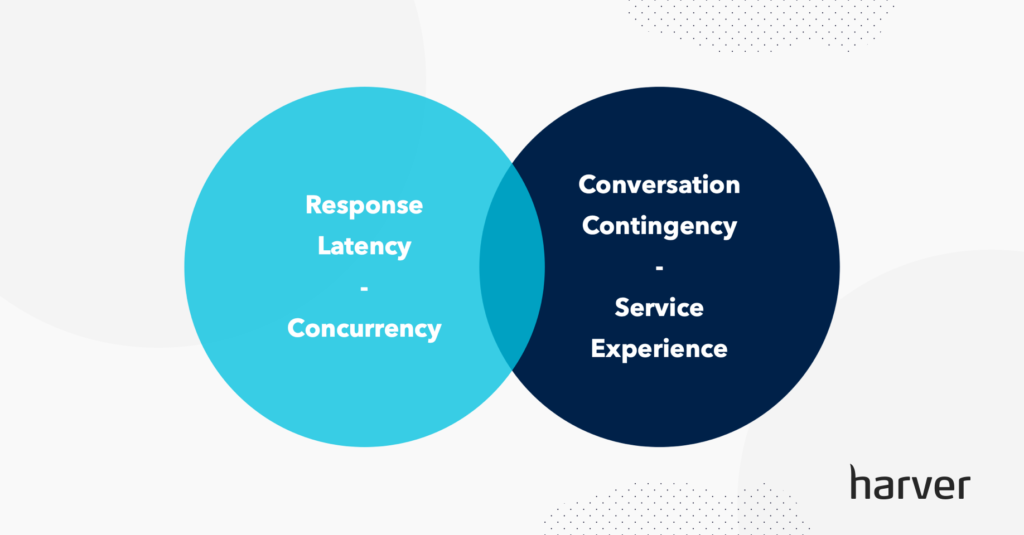
At the same time, they need to be able to build rapport and relationships with customers quickly, in order to resolve issues and move through tickets quickly and efficiently, without losing the quality of conversation.
That’s a big ask of anyone.
And it gets even more complicated when you factor in that the majority of live chats are initially handled by AI bots. But when the bot can’t answer a query, they hand it over to a live chat agent to resolve. Which means the agent is likely being handed a frustrated, angry customer, whom they have to calm down.
So that’s what an employer wants from a good live chat agent. However, it’s not what a customer expects.
A customer’s view of a great hire
Customers expect the full attention of a friendly chat agent. They want an efficient, fast interaction with a short latency between messages and a quality conversation that resolves the issue.
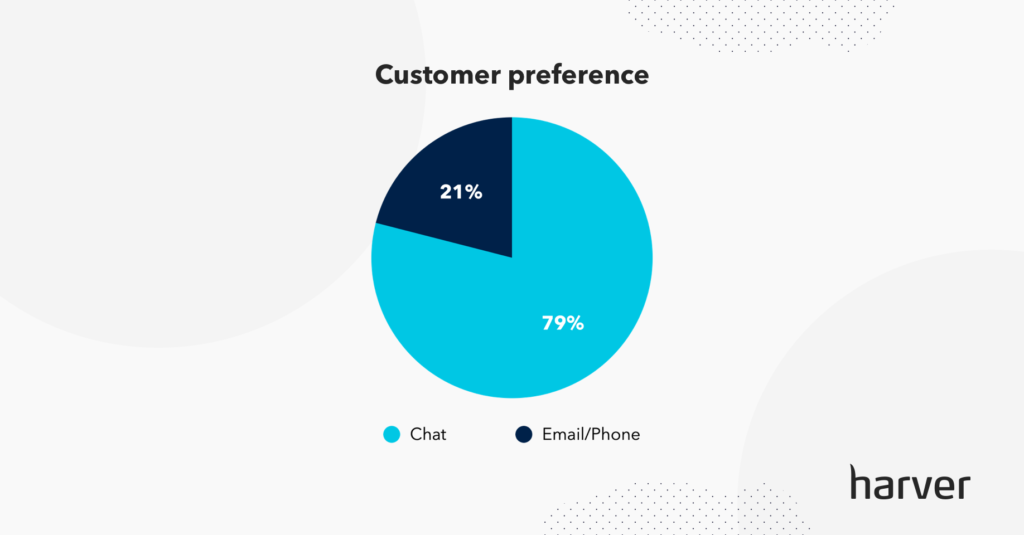
When you look at what makes a great live chat agent from an all-round perspective, therefore, you want someone who can keep the quality of conservation high, in a very stressful multi conversation environment, without losing the speed of interactions.
But how do you measure quality of hire for this role?
What is quality of hire?
Essentially, quality of hire is an important metric to track because it indicates the value that new hires bring to your BPO or contact center.
Not only does it contribute toward reducing cost per hire, but it also reduces employee attrition. Because when you hire quality live chat agents, you’re hiring people who are the right people, with the right skills and traits to be successful in the role.
Saying that, quality of hire is one of the most difficult metrics to track because there isn’t a standard assessment for measuring it. Quality of hire encompasses so many different aspects of each role in each organization, what matters to one team, might not mean anything elsewhere.
How do you measure the quality of live chat agents?
Quality of hire for live chat agents is usually determined by the outcomes you want them to achieve.
We’ve touched on a few of the key metrics you should track above, but here’s what we believe is a comprehensive list of KPIs you might want to keep an eye on to measure the quality of hire, per live chat agent:
- Total number of chats
- Customer tickets solved per day
- Average resolution time
- Chats per hour
- First response time
- Average wait time
- Customer happiness/satisfaction score
- First contact resolution rate
- Chat duration
- Website to chat conversion rate
- Chat to conversion rate
- Net Promoter Score
- Number of missed chats
- Quality assurance
A common issue that we’ve found when BPO and contact center recruiters evaluate candidates for live chat roles, is they often define quality as producing these outcomes and therefore recruit based on these metrics, rather than recruiting people with the key skills that produce these outcomes.

“The communication channel drastically changes the playfield of what qualities you need to look for in your hires to reach your preferred outcome.“
— Linn Hadenius
So if the metrics above indicate the quality of hire, what are the key characteristics, traits, and skills that quality live chat agents possess that enable them to produce these outcomes?
Key skills and traits to look for
When you take into consideration that only 7% of all communication is verbal, 38% is the tone of voice and 55% is body language and facial expressions, as a chat agent you don’t have much to play with.
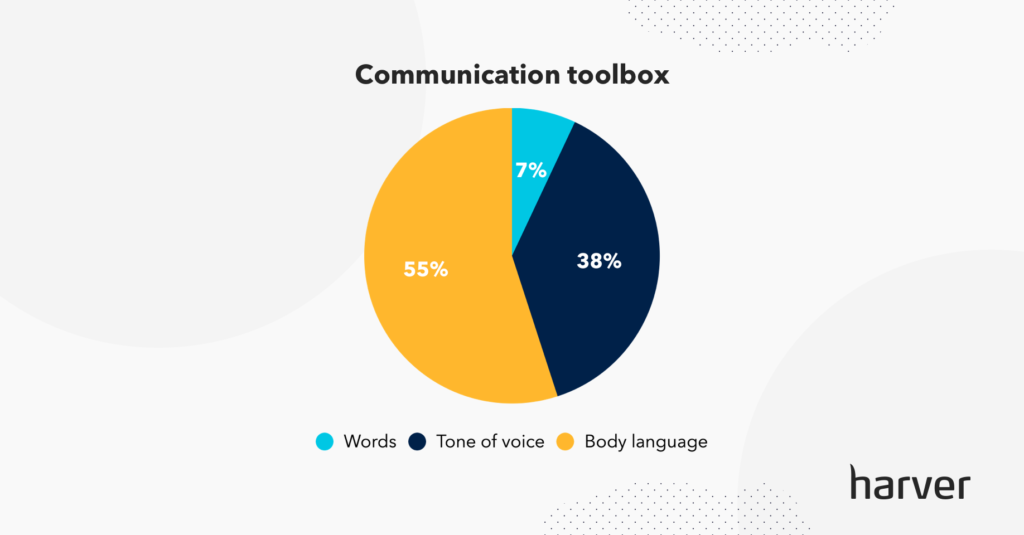
To be successful as a chat agent, therefore, you have to have a particular skill set:
- Patience
- Fast learners
- Proactive
- Reading comprehension
- Typing skills and speed
- Accurate data entry
- Grammar, spelling, and punctuation
- Customer orientation
- Problem-solving
- Clear communication
- Multitasking and concurrency
- Stress tolerance
- Memorizing conversations
- IT proficiency to navigate chat systems
- Being able to close a conversation
As a recruiter who needs to fill this role, you’re interviewing potential chat agents who say they’re great at problem-solving, are customer-oriented, and have a high-stress tolerance.
All good, but we are all guilty of massaging our resume so the recruiters like what they read. This is why you need to assess candidates’ efficiency and quality skills with objective and unbiased pre-employment chat assessment tests.
Hire better live chat agents, at scale.
Dive into the rise of live chat, the skills of top-performing agents, and how to best assess them to reduce attrition and guarantee top-notch customer service.

The Harver solution: Chat assessment tests
Being intimately familiar with the challenges faced by BPOs and contact centers when hiring chat agents, we’ve designed and built our Live Chat Support Simulation module as an all-in-one chat assessment test solution that measures four key constructs of the ideal live chat agent: three relate to the quality aspect, and one to the efficiency aspect.
For quality, we assess:
- Customer orientation – empathy, patience, going the extra mile
- Problem solving – understand the issue, ask the right questions, find the answer, give the correct answer
- Clear communication – simple language, no technical language
For efficiency, we assess: the time to respond.
This is the theory. In practice, it looks something like this.
Live Chat Support Simulation example
Candidates are presented with the below screen.
Throughout the chat agent pre-hire assessment, candidates are asked questions from virtual customers related to different support issues, with a new customer popping up every 30-60 seconds.
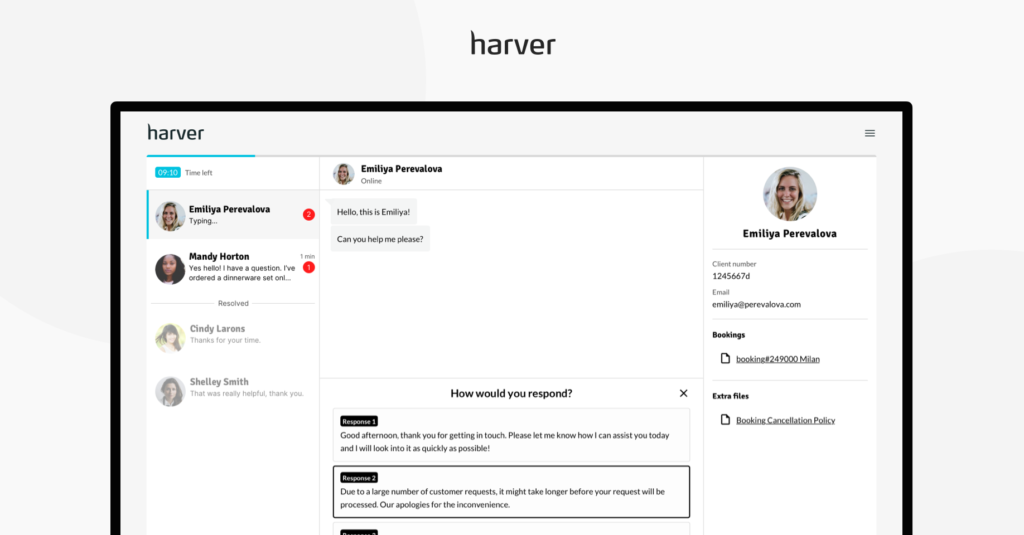
After customers send questions, candidates have to select the best response to support them, from the different available options. They don’t have to type answers, just pick the one they think works best.
Their answers are rated from best to worst in the backend because we’re testing specific skills and traits. These answers will contribute to the candidate’s overall quality score.
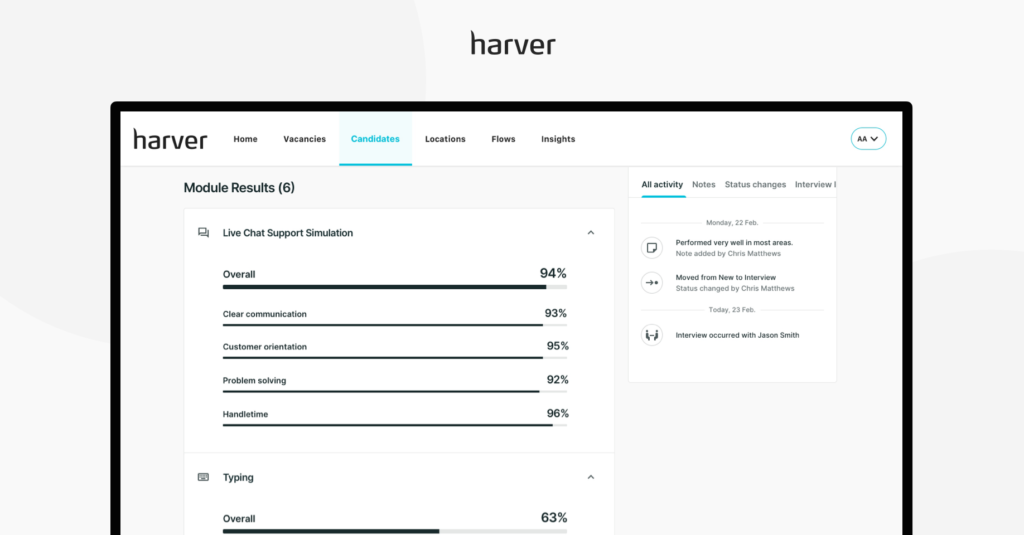
For some questions, candidates will have to look up answers on the simulation; this requires good multitasking skills because they have to absorb the information using their reading comprehension skills in order to provide customers with an accurate answer, in a timely fashion, while still receiving questions from multiple other customers, simultaneously.
The test is designed to test their ability to work under pressure while maintaining a high standard of customer service. Most candidates manage to deal with 2-3 customers in the time it takes them to carry out the assessment.
Candidates can see the number of questions increasing on their screen and because this looks very similar to the screen they’d use on a daily basis, if they find the test overwhelming, they won’t enjoy the job for real, nor will they be good in the live chat role.
Candidate responses are scored for the above four characteristics (customer orientation, problem-solving, clear communication, and time to respond). These scores are then displayed in your Harver dashboard.
These scores compare candidates against the general population or your own benchmarks, to identify what makes a great, average, and poor candidate for your specific organization.
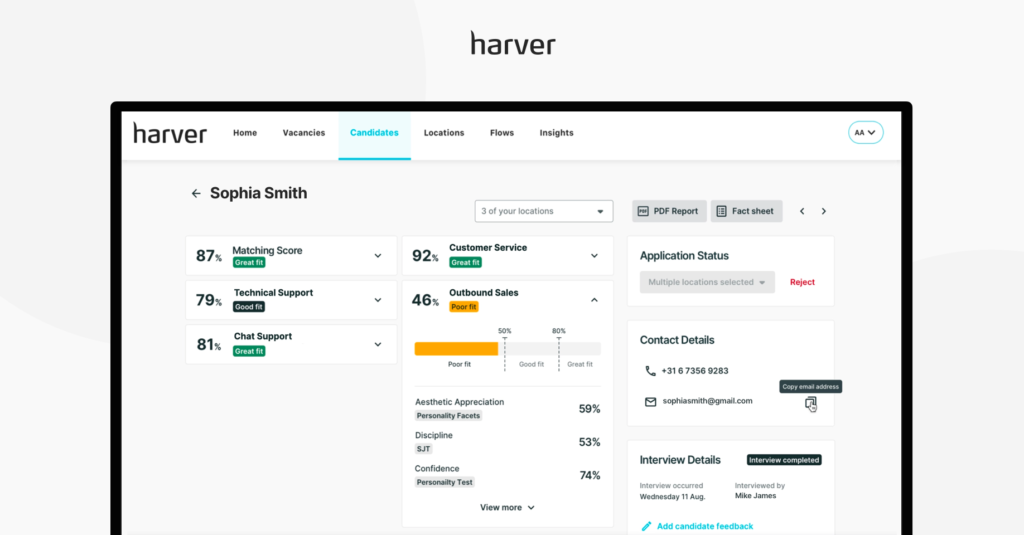
The overall score at the top of the results page is the overall matching score. This score will help you quickly and efficiently identify top candidates.
Underneath these scores are matching indicators, so you can see, at a glance, if a candidate is a good fit, but they might need additional training in some areas.
The overall feedback from our clients is that they like the assessment because it’s a good predictor of final job performance. Applicants at their turn like the assessment because it provides a great realistic job preview.
Next steps: Choosing chat assessments
From typing tests to situational judgment tests (SJTs), to Live Chat Support Simulation, we have a suite of scientifically proven pre-employment assessments to help you assess candidates and provide you with actionable data to drive your fair hiring decisions and ultimately improve your quality of hire.
You can either choose to use separate tools that assess different skills individually, or you can implement an all-in-one, end-to-end solution. Below you can see how this module looks in practice.
Experience our best-in-class Live Chat Assessment first-hand!
Perfect for remote hiring, our live chat assessment makes it easier than ever to hire live chat agents. Candidates experience the job, while you get actionable data to drive hiring decisions.
The chat assessment module includes custom scenarios, assesses the characteristics needed for your chat agents, scores their skills, and gives you a clear overview of who’s a potentially good hire in one easy-to-understand dashboard.
At the same time, the live chat simulation assesses candidates with real-life scenarios that measure chat support KPIs such as average chat handle time, service support level, agent adaptability, customer focus, and ability to multitask.
The tool is therefore an excellent way for new live chat agents to get a feel for what their day-to-day role will be like, in a true-to-life simulation, reducing the risk of misaligned expectations of the role.
As such, this engaging and creative pre-employment assessment offers candidates the opportunity to self-select and filter themselves out from the recruitment process as they see fit, decreasing attrition rate and improving quality of hire in the long run.
And because our live chat support simulation can be completely customizable to your organization, everything from the interface to your branding will be true to reality.
So, the only question remains: are you willing to digitize your recruitment process and improve the quality of your live chat agent hires?
Ready to transform your hiring process?

